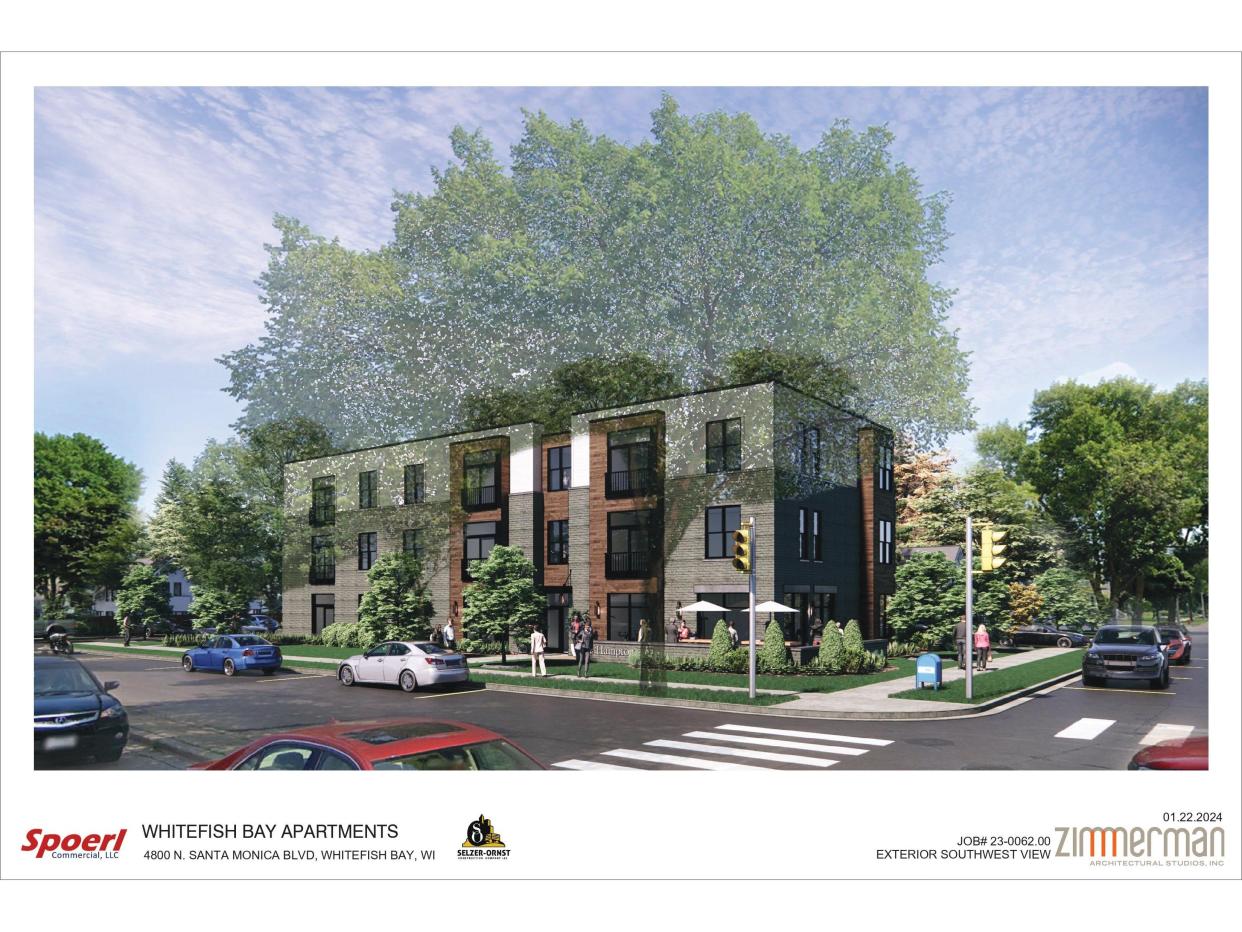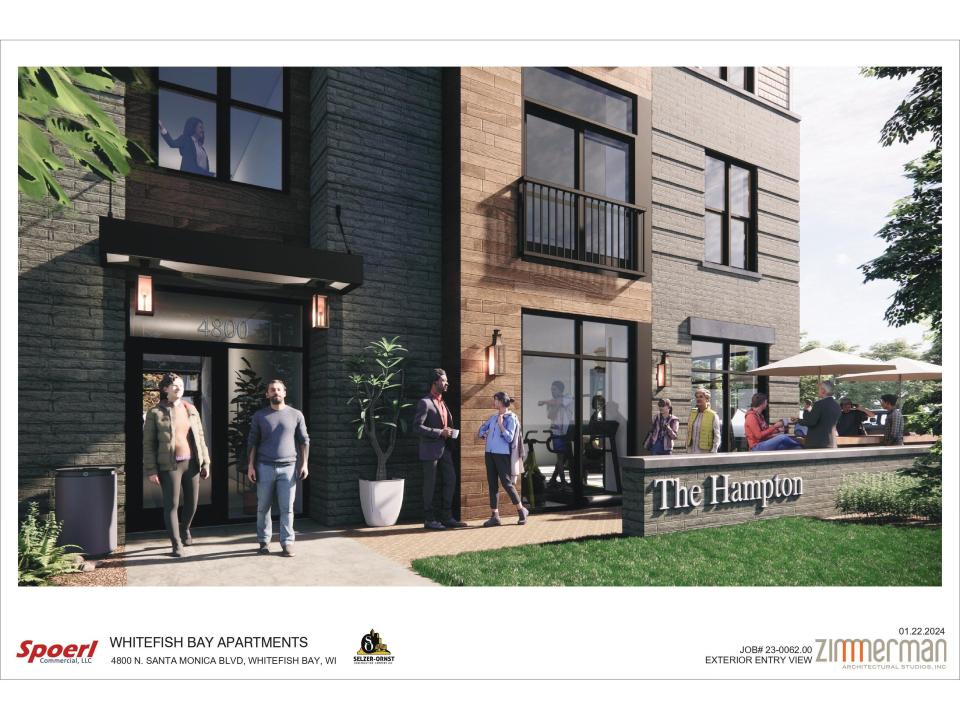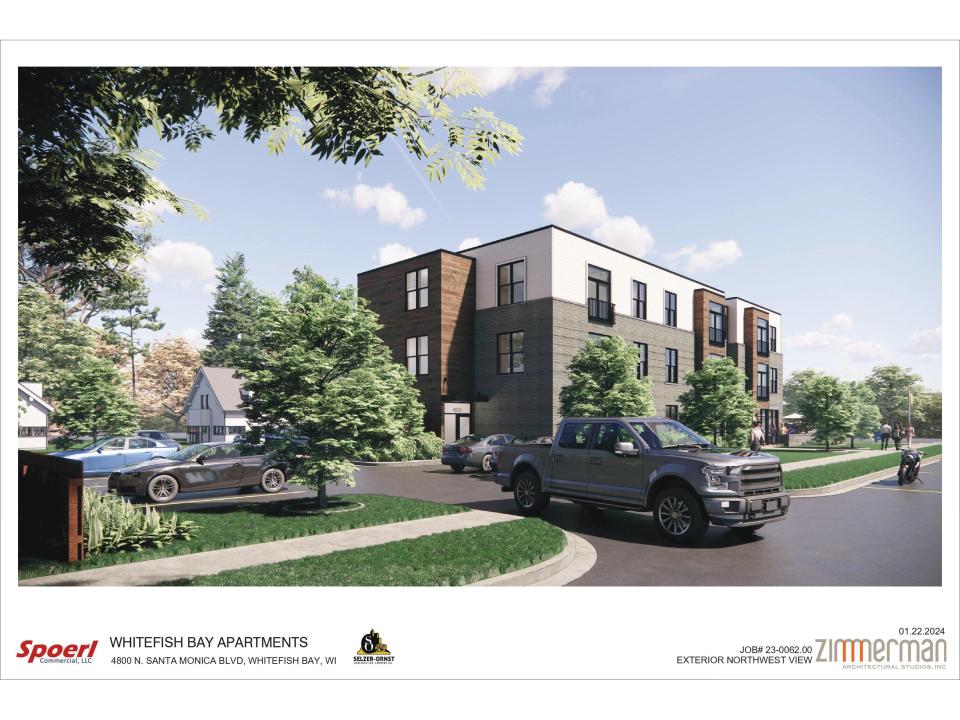Reversed: Whitefish Bay appeals board overturns the rejection of affordable housing plan

Whitefish Bay is getting its first publicly financed affordable apartment development.
In a 4-1 vote, the village's Board of Appeals Feb. 13 reversed a separate commission's rejection of a 17-unit development known as The Hampton planned for the intersection of North Santa Monica Boulevard and East Hampton Road (at 4800 - 4818 N. Santa Monica Blvd.).
In addition to reversing the decision, the board also approved updated plans that addressed some concerns voiced by neighbors about the proposal. The revised plans included new colors, materials, a fence and shrubbery along the north line of the property to provide a buffer from the parking lot.
Plans for the three-story proposal were stymied on Dec. 21 when the village's Architectural Review Commission voted 4-2 to reject the project, saying it "still didn't feel like Whitefish Bay," and that the proposed parking lot could negatively impact the values of surrounding property, according to minutes from the meeting.
The commission aligned their reasoning with village ordinances outlining the commission's purpose of maintaining "the perpetuation of village character" and standard for reviewing developer Brian Spoerl's proposal, which says proposals must be in "harmony with the general character" of a neighborhood.
But housing advocates inside and outside of the village argued that an unmistakable consequence of maintaining the "character" of a place, in part designed by redlining and racially restrictive covenants, is that the vestiges of those illegal and discriminatory practices live on.
The developer, Spoerl Commercial, originally pitched the project as a four-story luxury apartment complex with first-floor retail in June of 2023, but neighbors opposed to the project argued it would negatively impact their home values and add more traffic to an already dense area of the village.
In mid-December, Spoerl obtained federal grant funding through Milwaukee County to help finance an affordable version of the development, which would align with both the county and village's expressed priority of increasing affordable housing.
Around 50 people attended the meeting in person, and about 40 attended virtually.
During the discussion, Board of Appeals member Ari Kasper called the commissioners' reasoning "arbitrary and capricious," in particular, the lack of feedback given to clarify what "still doesn't feel like Whitefish Bay" means.
"It's hard to find an interpretation of that code that isn't subjective," Kasper said.

The Board of Appeals assessed the commission's reasons for rejecting
Representing the Architectural Review Commission, Chair David Domres shed light on the reasoning behind the commission's decision. Domres himself was one of two commissioners to vote in favor of the proposal at the Dec. 21 meeting, but he said other commissioners still took issue with the parking lot design and felt it didn't fit the neighborhood.
In the appeal and before the board, Spoerl Commercial argued the commission did not follow village code in issuing a rejection with arbitrary, vague and unactionable feedback.
The ARC had expressed a preference for an underground parking lot, which isn't currently allowed in the proposal site's district under zoning laws, Attorney Tom Gartner from the firm Michael Best argued before the board.
"There was no way for the applicant to understand just what the ARC (Architectural Review Commission) felt would meet its objective," Gartner said.
The board agreed that the commission shouldn't be able to require something not allowed in the code for approval.
The board also agreed it did not have enough evidence to dictate whether the parking lot would devalue surrounding property, as commissioners claimed.
Board member Michael Kelley said he struggled to see how the $5.9 million development in a desirable location would devalue surrounding properties in the first place.
Village Attorney Chris Jaekels told the commission the burden to provide concrete evidence in the form of an assessment would have been on the neighbors who raised the property value issue. Domres said the commission hadn't been presented with any evidence on the property value question.
One member of the Board of Appeals, Colin Daly, said the ARC's lack of actionable feedback and guidelines for improvement is a potential accountability issue.
Daly and two other board members expressed concerns about structural and procedural aspects of the commission and urged the village to rethink it.

Residents and advocates speak up
Around 15 people spoke during the public comment portion of the meeting.
Dynasty Caesar, a senior campaign organizer for the Redress Movement, a national organization with roots in Milwaukee that focuses on redressing racial segregation, told the commission that the project offers an opportunity for people who had historically been excluded from the village to become part of the community, though it may not be the developer's primary goal.
She said the discussions about property values and the parking lots call back to discriminatory and now-illegal practices. "All of this language is the same language that was used for redlining. It's the same language that was used for blockbusting. It's the same language that was used for white flight."
The last time Caesar spoke at a Whitefish Bay village meeting was when the village repudiated housing covenants in 2022. She said the project offers an opportunity to follow up on that action.
Chris Erickson, a resident and leader of the local street safety group WFB Safe, said the real takeaway should be that there are "significant problems about how we consistently approach development in the village and how forward-thinking we are about trying to solve our affordability issues."
Erickson said the commission, a group of volunteers, is faced with an unfair and unreasonable task, and he said that the village board should rethink aspects of the commission or the zoning code that are overly subjective and outdated.
"Business as usual has done more harm than good," he said.
Erickson also encouraged the village board to address residents' traffic and safety concerns around the intersection.
Resident and Wisconsin AARP President Leslie Spencer-Herrera spoke in favor of the project, as did Margaret Daun, chief corporation counsel for Milwaukee County, and Jim Mathy, administrator of the county's Housing Division.
In mid-December, the Milwaukee County Board agreed to give Spoerl $2,855,759 in American Rescue Plan Act funds and $232,329 through the HOME Investment Partnerships Program to help fund the project.
"Anytime there's change, we get afraid," said Daun, who recently announced her departure from her role. "When we look at standards that are inherently subjective, it's easy for fear to find a way to express itself."
She said that within all the subjective language in Whitefish Bay's code is a call to question whether the words express Whitefish Bay's values of inclusion and accessibility or a desire to preserve the status quo out of fear.
Daun urged the board to reverse the rejection, since any further delays would likely stop the development. "We the county are looking to spend those ARPA dollars. We need to do so with some speed. There are time limits," she said.
Still, some neighbors of the property site showed up, urging the board to sustain the rejection.
Alex Numela, who lives near the proposed site, said the one-bedroom units don't fit in with the area's prevalence of families.
Another neighbor, Kristin Schiestle, said she wishes Spoerl had worked with neighbors throughout the process. She said they were blindsided by the news that Spoerl had changed course with plans to propose a three-story affordable development with already-secured county funding after he'd received several rejections for the luxury apartments and retail proposal.
Brad Rosenquist, who also lives nearby, noted that Spoerl's development would raze a four-unit apartment building and a single-family home, a total of five units that are already affordable based on Milwaukee County's annual median income of $50,000.
By eliminating those five existing units, Spoerl's 17-unit proposal brings in a total of 12 new units to the village.
"That's 12 doors in which the property developer is getting $3 million in public money for," Rosenquist said.
Yet Rosenquist also said the corner isn't equipped to handle the increase in traffic that 12 new units would add. According to the Whitefish Bay Police Department, the area that saw more accidents than any other intersection in the village between January 2017 and July 2023 ― a total of 16, according to the Whitefish Bay Police Department.
During public comment, Mathy stated into the record that, if the development is approved, as the county's housing director, he would offer his assistance to the families in the five units who would be displaced.
Contact Claudia Levens at clevens@gannett.com. Follow her on X at @levensc13.
This article originally appeared on Milwaukee Journal Sentinel: Previously rejected, affordable apartments now a go in Whitefish Bay

